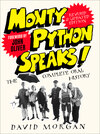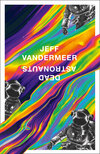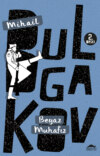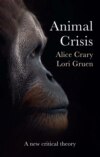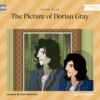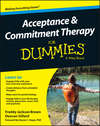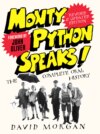Kitabı oku: «Monty Python Speaks! Revised and Updated Edition», sayfa 6
FRANKLY I DON’T FULLY UNDERSTAND IT MYSELF, THE KIDS SEEM TO LIKE IT
MACNAUGHTON: Now Terry Gilliam was meanwhile working on the animation links for all the shows; sometimes Terry’s film would arrive on the day we were recording that certain episode. No one had seen it beforehand, but everybody trusted everybody else. Which was a very good thing.
GILLIAM: [In story meetings] I always had the most difficulty because I could never explain what I was doing; whenever I did, there would be these blank faces. I was in maybe the best position because I had the most freedom. The others had to submit all their material to the group and get rejected or included or changed; mine, because I couldn’t explain it, and because we were always revising at the last moment, was pretty much never touched.
What was the actual process like for you?
GILLIAM: Sometimes I had an assistant working on Python; Terry’s sister-in-law Katie Hepburn assisted me for a while. Basically it was me on my own, with books.
I’d always start: there were the scripts, they go from there to there, and I just sort of had an idea, an image to start with. A lot of times I had a lot of ideas, a lot of things I wanted to get into the shows; I just had to stick them in between and find connecting tissues to get from there to there. So I would use these little storyboard sketches, then I would start looking for the artwork; whether it was stuff I had drawn myself or pictures that I got from books, I’d start getting the elements together.
And in the end the room is all these flats full of artwork. It became like a scenic dock for a studio: I’d have the ground, and I’d have different skies, and I could build a background very quickly after a certain point, and then I just started, totally a magpie approach, things that I liked I use and chop up. If it was photos I needed, I’d send the books in to the photographic place and blow them up to the sizes I want and start cutting them out; usually they wouldn’t be complete so I’d have to draw or airbrush part of it.

Conrad Poohs and His Dancing Teeth.
So I’d have all this artwork and I’d go to the BBC’s rostrum camera, set it up, and just start pushing the stuff around. You’d find at three or four in the morning the papers arranging themselves after a while! The stuff kind of made itself. You pile all these things there and they start forming patterns, a thing lands on top of that; ooh, that’s an idea. It was really free, because even though I had storyboarded and set out with a very specific look or an idea I was after, if I couldn’t find it I’d grab something that was just as good or it would be a little bit different than I expected but I could make it work, and it would flow in that direction.
And I would always shoot long; a lot of the work was done in the editing room afterwards, because I never knew quite [how long] somebody would talk. I would just wiggle the mouth up and down – leave it open for twelve frames, close it for ten – and then later I would chop frames out to try and get it vaguely to [match] whatever was being said. And then for voices I either do them myself, or I’d run and get the guys in the corridor, or in rehearsal. I just stand there with a tape recorder and say, ‘John, say this, say that; okay, good, thank you. Terry, say that …’ And the BBC had a great sound effects library which is all on discs, [but] a lot of times I’d just sit at home, a blanket over my head, with a tape recorder, making noises with kitchen utensils, and just record this shit. And then I’d get down to the editing room and we’d start sticking it all together. I was working seven days a week, it was just crazed. There’d be at least one all-nighter in there.

Cannibalism, Gilliam-style.
All the underground press were convinced I was an acidhead, they thought all of us were on drugs but me in particular, and we weren’t – it’s all natural stuff!
And it’s not like a Disney cartoon where everything’s planned and drawn; it’s using things around me, and just incorporating and letting it grow organically.
I was producing this stuff in two weeks [for each show]. Some of the [location] filming I wouldn’t get to because I was desperately trying to get ahead. I’d have to keep up with the shows, so by the end of the series it was always a mad rush. It was weird.
When you sail in a race, you just go out on the ocean, and you come around a buoy and all the boats are there, and before you get to the next marker everybody disperses and goes a different way; suddenly you’re alone. And then you come to the next marker buoy and Oh! Everybody converges. And it was kind of like that in doing the shows; we’d have the meetings, I’d be there as part of the group, then I’d go off into my world, and we’d only get together the days the shows were being recorded. So they were always together, they were always at rehearsals. My problem was there was one side of me that wanted to be a performer as well, but I really didn’t think I was in their class, so I’d just turn up on the days we were recording and take that little part there, put on a costume, do something silly there, just to keep myself both from being bored and feeling more a part of the thing. Because they were having all the fun, and I felt I was doing all the work!
In story meetings, would you ever bring a fully devised sketch to be animated, such as ‘The House Hunters’ [in which two hunters armed with ‘condemned’ posters track a wild building]?
GILLIAM: I wouldn’t have brought it in as a sketch – I would bring it as an idea. ‘I want to do this whole thing about house hunters, it’s a literal thing.’ And again they didn’t know quite where to put those things because they couldn’t imagine them; that was part of the problem. If I wanted to do that little story, in a sense it was up to me to find the right spot to slide that in. I’m trying to remember whether I would actually say, ‘I’ve got a thing that’s probably going to run about three minutes.’ I honestly can’t remember whether I was ever that specific. Because we’d try to work out a thirty-minute show, so I’m sure I must have been saying ‘a big chunk’. ‘I’ve got a big thing to do here,’ something specific!

A typical magpie approach.
Terry always loved what I was doing, and Mike. It’s so weird because Terry and Mike are much more visually oriented than the others, but it may just have been my inability to explain things. John I think was constantly bemused by my stuff, he was so – ‘intimidated’ is probably too strong a word, but he didn’t know how to criticize it, so he never criticized it except for this one thing where he could actually go, ‘Well, that’s blasphemous,’ or ‘That’s offensive.’ [See page 146.]
That was the bad side of it: I felt at times I wasn’t getting any of the benefit of the criticisms of the group. We all had to be self-criticizing, saying, ‘That doesn’t work,’ ‘That’s not good enough for the shows.’ But a lot of times I never got a sense that they knew whether [what I did] was good or bad, whether it worked or didn’t work, because it was another language that they don’t understand. John didn’t understand the language.
In the English language there’s no word for ‘visual illiteracy’. You have ‘illiterate’, but visual? There’s no term for it; it’s the idea that visual things are not a language. There is a visual language, and yet people who invent words don’t invent that word. I want to use ‘ivvisualites’, people who are visually illiterate.
It’s a thing that intrigues me, the information you get from images; they’re saying things and they’re telling these stories and they don’t necessarily have to be words. Being down with these kids at the Royal College’s Animation Department, some of the stuff they’re doing is just wonderful, but if you sit down and go, ‘Tell me the story,’ they can’t do it. A splotch of stuff here, a funny little noise happens there, what’s that? And yet it’s fantastic – at least it is for me. I look at some of their stuff and I’m not sure that John Cleese would find it funny, I don’t think he would know what to say about it. Sounds like I’m picking on John, but he was the most visually illiterate; I think it’s that. But I wish the others would have been able to come up and say, ‘Terry, that’s pretty weird.’ They didn’t!
Was any animation ever rejected out of hand?
GILLIAM: There was this thing that Ian MacNaughton just completely fucked up because he didn’t understand it, and Terry hadn’t been in the editing room that day. It was a strange abstract thing – it’s really hard to describe! I mean, it was like trees growing and reaching barriers in space you can’t see, and then they go around and did all sorts of really strange and interesting things. And I don’t know what he was thinking when he did it, he just didn’t get what it was and he cut it. That was a big mistake, [but] that wasn’t like somebody censoring.
BUT IT’S MY ONLY LINE!
CAROL CLEVELAND, ACTRESS: I had been doing a fair amount of work at the BBC, doing what I call – I think this is my own definition – a ‘glamour stooge’, working alongside people like Ronnie Corbett, Ronnie Barker, and Spike Milligan.
When the Pythons were starting, I hadn’t met any of the fellas at all, though I knew a little of their work. They’d written five episodes of the original thirteen, and they were looking for a female. Somebody at the Beeb suggested my name and John Howard Davies saw me and cast me. I hadn’t realized at that stage that my contract wouldn’t go further than four episodes; I only discovered that when my agent got in touch with the Beeb. By this stage we’d got going and I got on extremely well with the guys, they thought I fitted in beautifully. I think they were more than happy with my contribution, and when Michael came up to me when we were doing episode three and said, ‘Oh, we have got something great for you coming up,’ – because already they felt that they weren’t quite utilizing my talents enough and they wanted to give me something more to do than just giggle and smile, as I did in the ‘Marriage Guidance Counsellor’ sketch – I said, ‘Well, it sounds great but I’m not in episode six.’ And he said, ‘What? What?’ And he went over and spoke to the others, John came over and said, ‘What’s this?’
So they said, ‘Absolutely no way – we want you with us for the rest of the series.’ So that’s what happened. I really owe it to the fellas that I became the Monty Python girl because they put their foot down.1
By now Ian MacNaughton was doing the directing. Ian wanted to have different ladies in each episode and he wanted to be responsible for the casting, so the fellas put their foot down and said, ‘Uh-uh.’ They came to the agreement that if Ian wanted someone to just literally stand there and say nothing and just look pretty, fine, he could cast that, but if there was any sort of acting involved, the fellas wanted me. And that was the agreement they came to and that was how I came to be in the series.
How was working with the Pythons different from working on other comedy programmes?
CLEVELAND: Working with Spike Milligan was almost traumatic – an amazing experience but exhausting because you never knew what this man was going to do next. But the other people I worked with were all fairly sane – I mean, very funny but it was all fairly sane stuff, you knew what was going on; there wasn’t quite such a lunacy with those. With the Pythons I really didn’t know what to expect. It’s just a wonderful combination of looniness and great wit and intelligence and foresight. When I first joined them, I didn’t honestly quite know what to make of it to begin with. I remember the first two or three days of rehearsal thinking, ‘I don’t know if this is going to take off,’ because they were sort of all over the place. It was fairly manic.
We didn’t actually do a lot of rehearsal. If anything, it was under-rehearsed to keep it fresh and fun. Lots of people say to me, ‘How much of that was improvised?’ Because it came over so fresh, they felt a lot of it was being improvised. And I say, ‘Well, none of it; none of it was improvised. It was all scripted, everything.’

Carol Cleveland, steadfast straight woman to the group, in Monty Python Live at the Hollywood Bowl.
There wasn’t a lot that went on in the first few days of rehearsal; because they had written it themselves, they knew exactly what they wanted, so they knew just what was going to happen. Once they knew exactly what they were doing, in order to keep it fresh, we’d just stop rehearsing and the rest of the time was mucking about. Once we’d done our little bit of rehearsal we’d go, ‘Right, that’s good now, we don’t want to sort of louse it up,’ we’d do something like play football. So all of the furniture would be moved aside and we set up a couple of goals at each end and we’d have a football match. I was always a goalie! And we had a great time at rehearsals mucking about, I have to say, much to the amusement of passers-by. When we were in the BBC Centre rehearsal rooms (which are great, big, vast rooms), all the doors have little peek-through windows, and it was wonderful – as people pass by, you’d see them come back and take a double take, and not know what to make of it. They thought we were rehearsing a football sketch that went on day after day after day.
What allowed you to work so well with the group as their foil?
CLEVELAND: Well, certainly I was very prepared to have a go. There was very little they could ask me to do that I would ever say ‘no’ to. I was willing and able, and I’d throw myself into it with great gusto. I guess there’s a fair amount of lunacy in me, there must have been to get into things the way I did, and I think that was very appealing to them. I could do the sort of ‘glamour dollie bird’ bit and put that across very well but at the same time send myself up on that. I was quite happy to go over the top with anything and I think that was the other thing that they liked. And obviously they felt I had quite a good comedy flair and I looked good as well, which was a combination they wanted.
It still irritates me that I meet Python fans and their recollections seem to be of me without any clothes on! I never took my clothes off in Python, not entirely. There was a lot of me in underwear and showgirl outfits and bathing suits and lingerie, but never without any clothes. The nearest I came to that was when we were filming ‘Scott of the Sahara’. In that I’m being chased by a man-eating roll-top desk, having my clothes ripped off bit by bit by cacti. I’m running towards the camera on each occasion, and on the last one my bra comes off and I’m still meant to be running towards the camera and I was feeling a little bit shy about all sorts of things, and certainly the fact that we were filming on a crowded beach and there were masses of people milling about, so I did feel a little bit inhibited about that. I wasn’t happy about running towards the camera with my bra coming off so in fact they did change it. The last shot is of me topless running away with my back to the camera as I pass John sitting at his desk facing the camera. But that was the only time I think I ever resisted. And the funny thing is that I suppose if they asked me to do it now, I’d say, ‘Yeah, great, I’ll do it!’ But it’s too late now, they won’t ask me!
Was there difficulty in that there were Python wives and girlfriends who also appeared in the shows but not as frequently as you?
CLEVELAND: I suppose if I had been a wife or a girlfriend I wouldn’t have got the job! Connie Cleese appeared occasionally, and Eric’s then-wife Lynn Ashley appeared, but only occasionally. Neither of them would have actually wanted to be involved, I think; it was only because they were wives that they were brought in.
I don’t think I would have got the job if I had been heavily involved [with one of them]. And I remember very early on Terry Gilliam did ask me out on a date – when I think how things might have turned out if I’d said ‘yes’! I said ‘no’ for two reasons: first of all because I actually had a boyfriend who was an extremely jealous Italian, but I think I would have said no anyway because business and pleasure don’t mix. As it turns out Terry dated a make-up girl on the show, Maggie, and they’re now married and very happy.
What were your impressions of the Pythons?
CLEVELAND: Individually they were all as they were collectively: brilliant, clever, fun, very nice men. The only one I never really felt close to was Eric. All the others treated me like one of the boys, and I never quite felt that with Eric. Eric always seemed a little distant, rather aloof. He in my opinion was the most serious of the lot, and the most businesslike. He was the one that always had his head together as far as the financial side of Python was concerned. If anyone started getting a little bit too wacky he would be the one to say, ‘Well, yeah, but this one is going to cost such-and-such.’
Terry Jones: very excitable, being a Welshman very emotional, quite fiery at times. I was never present at the writing sessions or the business meetings but I’m told that he was the one that had been known to throw things. And he, along with Terry Gilliam, were the two looniest of the lot, who would cause the most havoc and confusion during the rehearsal period.
Terry Gilliam, also very excitable, very visual, very loud! And you never quite knew what was going on in his head, until you actually saw the animations – and when you saw the animations you really got quite worried about what was going on there!
Graham always did everything to excess, everything he did: obviously his drinking, and the way he flaunted his homosexuality, which wasn’t the done thing in the early Seventies certainly, and caused a certain amount of embarrassment at the time. Personally I felt quite embarrassed by some of his behaviour. I don’t know quite how to describe Graham; I sort of describe his behaviour rather than his personality. He was a lovely man. I think because of his drinking and his homosexuality, everyone felt they needed to take care of Graham a little.
John: the most logical, definitely moody, like all comic geniuses a complex man but he was the only one who really changed during the course of Python. When he was going through his questioning period with his psychoanalysis, he was actually at times quite unpleasant to be around. He was unfriendly and difficult – certainly that’s what I noticed. Fortunately, by the time we were doing Life of Brian he was back to being his fun self.
And as for Michael, well, Michael has never changed. He’s the one that’s never changed at all, and he remains the same charming, shy, sweet, helpful person that he is, and he is of course the only one who’s actually quite shy, and that’s very appealing, which is why all the women adore Michael. He was always the ladies’ favourite.
IF THEY CAN’T SEE YOU, THEY CAN’T GET YOU
MACNAUGHTON: This was a very strange thing because when I’d done four or five Monty Python shows which had not yet gone out, I was called to the head of entertainment, who said to me, ‘I don’t think we’ll be renewing your contract.’ I had a year’s contract. So I said, ‘Oh, really? Why not?’ He said, ‘Well, this Q5 show of yours was a bit of a cult success, but only on BBC2. [!] And who really wants to see the Monty Pythons?’ They were ready to drop me. It wasn’t that they were going to drop the Pythons; they just didn’t think that the way we were doing it – which meant me as producer and director – was what was wanted. Fortunately I think their public became of a different mind – the Pythons went out and became a cult success.
Promotional item in the Radio Times:
MONTY PYTHON’S FLYING CIRCUS
is the new late programme on Sunday night.
It’s designed ‘to subdue the violence in us all’.
The first Python show, broadcast on October 5, 1969, demonstrated quite clearly that the group was after something quite uncategorizable. It presented a surreal mix of violence (Wolfgang Amadeus Mozart hosts a programme depicting famous deaths); television parodies (‘We find that nine out of ten British housewives can’t tell the difference between Whizzo butter and a dead crab.’ ‘It’s true, we can’t!’); occasions where all propriety is ripped to shreds (an interviewer proceeds to address his guest as ‘sugar plum’ and ‘angel drawers’); some intellectually tainted comic bits (Picasso paints while riding a bicycle, followed by Kandinsky, Mondrian, Chagall, Miró, Dufy, Jackson Pollock, ‘… and Bernard Buffet making a break on the outside’); and a loopy premise allowing for both some slapstick and social commentary (the tale of the World’s Funniest Joke, appropriated by the army as a weapon against the Nazis, who fail miserably at developing a counter-joke of their own). Running throughout the programme were gags and animations about pigs.
In the weeks that followed, the programme became more fragmented, more surreal, more violent. Sheep nesting in trees gave way to a man playing the ‘Mouse Organ’ (namely, some rodents trained to squeak at a certain musical pitch accompanied by a pair of heavy mallets), to a cartoon of a pram that ingests the doting women who lean too closely. Kitchen-sink melodramas were turned on their heads, as when a young coal miner returns home to his playwright father, who rants about his son’s values (‘LABOURER!’). A scandal-mongering documentary examines men who choose to live as mice (‘And when did you first notice these, shall we say, tendencies?’). And a confectioner is investigated for fraud in labeling his latest product, Crunchy Frog (‘If we took the bones out it wouldn’t be crunchy, would it?’).
How was the series sold originally by the BBC?
TOOK: Well, it’s this ‘new wacky series, these wacky kids, these bright new Cambridge graduates and Oxford lads who delighted us for years with their merry antics, now together at last in a brand-new series’. I suppose that’s what they did. That’s what they do about everything else!
GILLIAM: The BBC I think were constantly uncomfortable with us. They didn’t know quite what we were, and I think they were slightly embarrassed by it, and yet it was too successful, it was making all this noise out there. When they took us off after the fourth show (this was the first series), we were off for a couple of weeks, I think there was a serious attempt to ditch it at that point. But there was too much noise being made by us. The most wonderful thing was everybody tuning in when Python was supposed to run and it was the International Horse of the Year Show; in the middle of it, they were doing their routines to music, it was Sousa’s ‘Liberty Bell’ – our theme music. It was like Python was even there, you couldn’t keep it down!
But in the beginning they would put us out at all these different times, and change it, but somehow the word got out and they kept us on.
TOOK: The BBC split up into different areas, and the option was to take the show or not to take the show, and half the regions didn’t take the first series. So if you lived in London you’d get it; if you went down to Southampton on the south coast you wouldn’t be able to see it because they put on Herring Fishing in the North Sea or something. It was very irritating that the regions had that kind of autonomy; there was nothing you could do. But the word started to go around that this was very good and very new, and something they ought to have. So one after another came back into the fold, and by the time the second series was done, the complete network had it.
CLEESE: I had a friend who was trying to watch the series, and he sat down in his hotel room in Newcastle and switched it on and there was this hysterical start to Monty Python about this guy wandering around being terribly boring about all the ancient monuments around Newcastle. And he watched it falling about, and said it’s real nerve to do this, it’s really terrific and what a great start to the show. And about twenty minutes in he realized it was the regional off-time.
The nicest thing anybody ever said about Python was that they could never watch the news after it. You get in a certain frame of mind and then almost anything’s funny!
